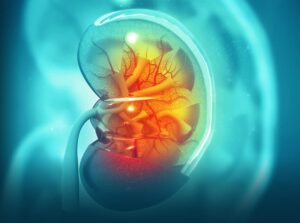A FASCINATING SPECIALTY IN DEMAND

Fascinated by urine, the kidney, and complex renal physiology? Nephrologists are masters of fluid, electrolytes, and acid–base homeostasis. After all, the kidneys are responsible for filtering out impurities from the blood. As part of their diagnostic workup, they analyze acid–base studies, electrolyte panels, and urine collections.
In this highly intellectual specialty, they treat all types of diseases of the renal system, such as infection, kidney stones, alkalosis/acidosis, autoimmune disorders, renal artery stenosis, and cancer. The nephrologist must understand how systemic diseases like hypertension and diabetes affect the kidneys, as well as be able to identify renal toxic effects of any medication. Long-term relationships are formed with patients who require chronic dialysis, and life-saving interventions such as acute hemodialysis are often provided within the intensive care setting. Nephrologists also treat postrenal transplant patients and manage the complications of chronic immune suppression secondary to post-transplant medical therapy.
There are several procedural skills to master, particularly the placement of hemodialysis and peritoneal catheters and the ability to biopsy tissue from the kidney. Some nephrologists gain additional interventional training and perform thrombectomies and even angioplasty of renal arteries. Although it requires technical skill, nephrology is also one of the most cognitive subspecialties within internal medicine. You can practice as a consultant, direct a dialysis center, work as an intensivist, or practice both nephrology and general medicine. Although dialysis patients can be demanding at times, solving their complex medical problems is highly gratifying.
Nephrology fellowships require 2 years of training.
WHAT MAKES A GOOD NEPHROLOGIST?
Likes physical diagnosis, pharmacology, and physiology.
Is a thorough, cautious problem-solver.
Can interact well with people and maintain long-term relationships.
Likes working with his or her mind.
Is a good, patient listener.
LOOMING SHORTAGE OF NEPHROLOGISTS
Recent data suggests a looming shortage of nephrologists, with only 60% of fellowship slots being filled in recent years. As the population ages, the demand for kidney services will increase, which means that there will be a demand for more and more nephrologists in the future. This is good news for those medical students interested in a specialty with good pay and high demand.
GOOD INCOME
The Medscape 2021 physician salary survey found that nephrologists on average earn $311,000 USD per year. That’s $63,000 more per year than general internal medicine, which earns on average $248,000 per year.
WANT TO BECOME A NEPHROLOGIST?
For those medical students who want a good income in which they have reasonable working hours and a specialty that is in high demand, nephrology might be right for you. And if your dream is to become a nephrologist, or any type of physician, then the University of Health Sciences Antigua School of Medicine is the way to make those dreams a reality!
For those of you have graduated from university and have the premedical requirements, our direct-entry MD program is for you.
If you are still missing some premedical courses, are a recent high school graduate with your eyes set on the prize of becoming a doctor as quickly as possible, then our accelerated premedical program is right for you.
We also offer an innovative joint MD/MPH program that will allow you to graduate with both your medical degree and the much-respected masters of public health. This will enhance your career prospects, as well as prepare you for careers in areas like preventative medicine and international health.
Let us help turn your dream into reality. Contact our Admissions Team today to learn how you can join the UHSA family!

